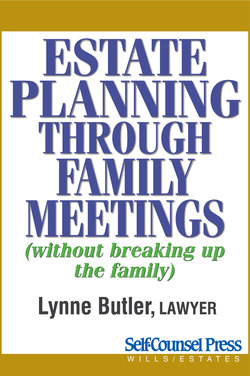Читать книгу Estate Planning Through Family Meetings - Lynne Butler - Страница 8
На сайте Литреса книга снята с продажи.
1.3 Wills and dying
ОглавлениеMost of us are not comfortable talking about dying, at least not about the deaths of our loved ones or ourselves. Almost nobody is comfortable asking their parents whether the parents have made wills. It is even harder to talk about wills if the parent is ill or hospitalized. Bringing up financial or legal questions when a person is dying or extremely ill may make you look cold or unfeeling to others who are distressed by the person’s illness. You are not alone in finding that this is an extremely sensitive topic.
Yet, as sensitive as the topic may be, everyone is better off if it is brought up and dealt with properly.
One of the first major decisions that will be made by your parent when making a will is the choice of executor. This term refers to the person or people who will be in charge of your parent’s estate when your parent dies. The executor’s job includes everything from making funeral arrangements and paying bills to settling claims and paying out the estate to the beneficiaries.
It is common for a married couple to appoint each other as executors, but do not assume that is the case for your parents without asking. Even if they do appoint each other as their first choice, one of them is probably going to outlive the other except in very unusual circumstances. Therefore, it is also necessary for them to appoint an alternate choice of executor to take over in case the other spouse is already gone.
Should one of your parents die, the surviving parent is not always a good choice of executor and the family members should be realistic as to the capabilities and wishes of each parent.
The surviving person might not be a good choice for the job of executor if —
• he or she is beginning to show signs of mental incapacity, memory loss, or confusion;
• he or she is not the one who looked after the family’s finances and has no familiarity with financial matters;
• he or she is overwhelmed, or likely to be overwhelmed, by emotions at the loss of his or her spouse;
• the parent who died owned a business that the other parent was not involved in;
• the surviving parent was the second (or subsequent) spouse of the parent who died, and the estate is going to involve the first spouse in some way; and
• he or she simply does not want to do it.
During the estate-planning process your parent can ask his or her lawyer for ideas about who should be the executor. There are plenty of possibilities, such as having one of the children act jointly along with the surviving parent or instead of the parent. Another choice is using a trust company, which is particularly suitable if there are likely to be family squabbles or disputes that will require a neutral third party as executor, or where none of the family members live close to the parents.
Whoever is chosen as executor should be aware that he or she has been appointed. If your parents want to appoint you or one of your siblings, they should let you know before they sign their wills. This is something that can be talked about at a family meeting.
A wills discussion will also cover the distribution of the estate, which refers to who will inherit the parents’ assets after they pass away. This is, of course, where most of the disputes arise with estates, and it is an area in which many parents take great care to craft an arrangement that is fair to everyone, in their view.
In some families the distribution can be as simple as dividing whatever money is left equally among the children, but it is not always that easy. One of the most important elements of the distribution of an estate is that of special situations that need more attention than most. These situations might include a family member who is disabled and must have his or her inheritance placed in a trust, a business that is being passed down to the next generation in the family, or a blended family that must balance the needs of a new spouse against those of the children from a previous marriage.
